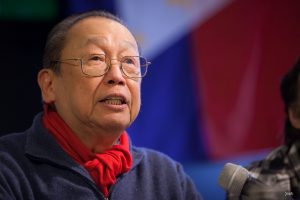JMS’ response to the news item ‘Palace twits Reds: ‘Ideologues-turned-extortionists’ »
[su_dropcap style=”flat”]T[/su_dropcap]he rural-based people’s democratic government of workers and peasants (sometimes modestly referred to in revolutionary literature as the local organs of political power) exists and is opposed to the urban-based reactionary government of big compradors and landlords now headed by Duterte.
 The people’s democratic government exercises functions of government in the fields of public education, socio-economic development, land reform, production, finance, health, defense, cultural affairs, judicial matters and so on.
The people’s democratic government exercises functions of government in the fields of public education, socio-economic development, land reform, production, finance, health, defense, cultural affairs, judicial matters and so on.
It collects voluntary contributions from the gains made by workers and peasants from their struggles for land reform and higher wages as well as taxes from the exploiting classes in exchange for the privilege of performing economic functions that are still useful to the people and cannot as yet be taken over by the people. Not so long ago, Duterte himself urged the businessmen in Mindanao to pay taxes to the revolutionary government or else lose their privilege to do business (in his words masusunugan).
The tax collected by the revolutionary government is very small compared to that collected by the reactionary government but is used mainly for the social and economic programs of the people and secondarily for administration by cadres and for the maintenance and expansion of the New People’s Army. All the taxes collected by the revolutionary movement remains in the Philippines for the benefit of the Filipino people and revolutionary forces. I do not have to get money from the revolutionary government. I rely on a Dutch charitable foundation for my medical expenses and I receive help from relatives and personal friends whenever necessary.
In sharp contrast to the revolutionary government, the reactionary government collects taxes mainly from the ordinary people in the form already added to the prices of goods and services that they buy and secondarily from the big corporations and the top bracket of high income people. In the Duterte tax reforms, the corporations and rich will enjoy tax cutbacks while the working people and other poor masses will suffer higher taxes and higher prices.
The worst that the reactionary government does with its tax collection is to feed the corruption of the government officials, to finance the military, police and paramilitary for controlling and suppressing the people, to enter into lopsided agreements and contracts with foreign countries and corporations at the expense of the Filipino people and to pay for the most fraudulent and onerous foreign loans.
The officials of every reactionary regime, especially the current Duterte regime, like to taunt the revolutionary movement for supposedly not having accomplished anything in the last 48 years. That is because they deny the existence and growing strength of the people’s democratic government, the people’s army, the revolutionary mass movement and the alliances in the guerrilla fronts and on a nationwide scale.
Since their 1968-69 starting point, the revolutionary forces have accomplished so much: from mere hundreds of CPP cadres and members to hundreds of thousands, from 9 rifles to thousands, from a few thousands of mass activists to millions and from the second district of Tarlac to more than 71 provinces and nearly all regions of the country.
[su_vimeo url=”https://vimeo.com/64710547″]
Relief and rehabilitation campaign of Philippine revolutionary forces in the aftermath of Typhoon Pablo (international name Bopha) in December 2012.
A political officer of the New People’s Army in Mindanao explains how the campaign is being run as a movement of the community residents rebuilding their homes and agricultural fields, and in the process strengthening their unity for the revolutionary cause.
Ang paglaban sa corruption sa loob ng gobyerno ang dapat bigyan ng pansin. Ito ang nagpapahirap sa bayan, hindi ang barya-baryang revolutionary tax.
Now its clear how the NPA managed to provide free services such as health and education in the countryside. They even provide humanitarian assistance for victims of calamities and help rebuilding their homes and livelihood.